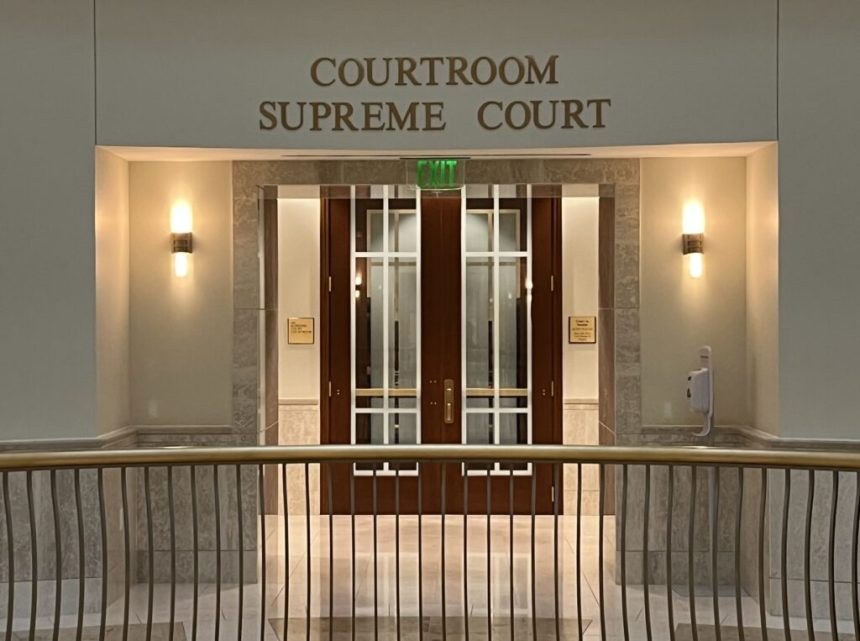The Iowa Supreme Court chamber in the Iowa Judicial Building on Feb. 22, 2023. (Photo by Kathie Obradovich/Iowa Capital Dispatch)
The Iowa Supreme Court heard oral arguments Wednesday about whether the state should end the practice of billing low-income Iowans for their court-appointed attorneys in cases where charges are dismissed.
In 2024, four separate theft charges against Ronald Pagliai were resolved through a plea agreement, in which Pagliai pleaded guilty in two cases while the court dismissed the other two. In addition to being sentenced to serve 41 days, Pagliai was also ordered by the district court to pay victim restitution and court costs associated with all four cases.
Pagliai’s case before the state Supreme Court challenges the order to pay for court costs for the two cases that were dismissed, arguing Iowa Code asserts defendants who receive legal assistance are only required to pay court costs in cases of convictions or acquittals.
The case is a way for organizations like the American Civil Liberties Union of Iowa, Fines and Fees Justice Center, and Public Justice to challenge the state’s ability to steeply charge Iowans, who are given indigent legal defense because they cannot afford their own lawyer, as required by the Constitution.
While the right to counsel is guaranteed by the Constitution, states are still allowed to attempt to recoup costs by charging court fees in these cases, and a majority of states do so. But according to reporting from the Marshall Project, Iowa imposes higher fees than most other states — and these debts are rarely paid.
Iowa’s practice of charging low-income people for public defenders in cases that are dropped or where they are acquitted is also unlike many other states. This is the practice being challenged in Pagliai’s case, Alex Kornya, cooperating attorney with the ACLU of Iowa said. Kornya told reporters Wednesday the “lion’s share” of court debt in Iowa comes from costs assessed against low-income people to repay the state for their legal defense.
Iowa also stands out for charging “actual cost” of an attorney to the defendant, Kornya said, while other states often have statutes limiting how much the state can recoup on the cost of court-appointed defense.
Kornya said it was also “unusual” that Iowa assesses these debts against people even if they win their case. He also referenced the 2020 case State of Iowa vs. Lori Mathes, a similar situation where prosecutors dismissed a marijuana possession charge against Mathes in Monona County, with an order that she pay county sheriff fees, court-appointed attorney fees, and restitution. Mathes said she understood the bill to be $500 for court costs, but the amount she was expected to reimburse was nearly $3,000.
The Iowa Supreme Court ruled 4-4 in the Mathes case in 2020, with Justice Matthew McDermott recusing himself from the ruling. This stalemate declared the case “affirmed by operation of law,” meaning the state law allowing district courts to impose debt in criminal cases when charges were dismissed was allowed to remain in place.
Kornya said Iowa’s system of imposing these fees in cases where charges are dismissed is also more costly to low-income people than in cases where they are convicted of a crime.
“One of the things that we found to be, I think, particularly perverse about the assessment of these debts in dismissed cases is that — at least for convictions and acquittal — that people have a right to reduce the amount they owe based on their ability to pay,” Kornya siad. “When someone has a dismissed case, they bypass that ability to pay determination. So it’s not even as simple as saying that people who have dismissed cases are in the same position as someone who is convicted. They’re actually in a worse position, and often end up owing more for their case than they would have if they had been convicted, which makes no sense.”
The Pagliai case brought this subject before the Iowa Supreme Court again. Assistant Attorney General David Banta, who represented the state of Iowa in the case, argued that because Pagliai had agreed to pay for the costs of the dismissed charges through a plea agreement, he had waived his ability to challenge the district court’s authority on setting these costs.
But the state conceded in its Appellee Brief, “while the State maintains the district court had jurisdiction over Pagliai’s criminal cases, it agrees that it did not have statutory authority to order Pagalia to pay costs for dismissed charges,” but that Pagliai had allowed this authority to be put in place through the plea agreement.
Allowing Pagliai’s challenge to move forward would “affect how plea deals are made in the future,” Banta said.









